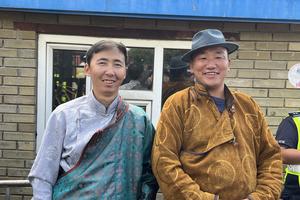Pope Francis at Mongolia Charity: ‘Only Love Can Overcome Selfishness’
The Pope’s Sept. 4 visit to the House of Mercy, a new charity in the Bayangol district of Ulaanbaatar, was his final stop in a four-day visit to Mongolia.

Addressing charity workers in Mongolia on Monday, Pope Francis said doing good requires loving others and seeking the best for them without expecting anything in return.
“To truly do good, goodness of heart is essential: a commitment to seeking what is best for others. Commitment for the sake of remuneration is not true love; only love can overcome selfishness and keep this world going,” he said at the inauguration of the House of Mercy.
The Pope’s Sept. 4 visit to the House of Mercy, a new charity in the Bayangol district of Ulaanbaatar, was his final stop in a four-day visit to Mongolia.
Francis blessed the sign of the charitable institution, which was established to assist women and girls escaping domestic violence. It also has temporary lodging for migrants and others in need, as well as a basic medical clinic for the homeless.
Built in a former school building, the charity is supported by the Catholic prefecture of Ulaanbaatar, the Pontifical Mission Societies Australia, and the Catholic Mission.
In his address to volunteers from the House of Mercy and other Catholic charities in Mongolia, the Pope illustrated his point with a story about St. Teresa of Calcutta.
“A journalist, seeing her bent over the foul-smelling sores of a sick person, once told her, ‘What you do is beautiful, but, personally, I wouldn’t do it even for a million dollars,’” Pope Francis recalled. “Mother Teresa smiled and replied, ‘I wouldn’t do it for a million dollars either. I do it for the love of God!’”
“I pray that this kind of gratuitous love will be the ‘value added’ of the House of Mercy,” he said.
Pope Francis praised the act of volunteering — what he called “a purely generous and selfless service that people freely choose to offer to those in need, not out of concern for financial remuneration or personal benefit, but out of pure love of their neighbor.”
“This is the style of service that Jesus taught us,” he emphasized, adding that “the true progress of nations” should be measured not by economic growth but by the ability to provide health, education and integral growth to one’s people.
“Therefore, I would like to encourage all the citizens of Mongolia, who are well known for their generosity and capacity for self-sacrifice, to engage in volunteer work, placing themselves at the service of others,” he said.
The Pope also addressed what he called three “myths” about charitable activities. Two of these myths, he said, are that only those with money can engage in volunteer work or that the only way to care for others is through hiring salaried staff. Another myth is that the Catholic Church performs works of charity only to persuade people to become Christian.
“No. ... Christians do whatever they can to alleviate the suffering of the needy, because in the person of the poor, they acknowledge Jesus, the Son of God, and, in him, the dignity of each person, called to be a son or daughter of God,” he said.
“I would like to envision this House of Mercy as a place where people of different creeds, and nonbelievers as well, can join efforts with local Catholics in order to offer compassionate assistance to our many brothers and sisters in the one human family. That would be a splendid witness of fraternity: a fraternity that the state will rightly seek to protect and promote.”
The 86-year-old Pope is the first pope in history to set foot in Mongolia. After a more-than-nine-hour overnight flight, he spent the first day of his trip resting at the apostolic prefecture.
During his time in the Mongolian capital of Ulaanbaatar, the Pope met President Ukhnaagiin Khürelsükh and gathered with the country’s small Catholic community.
Mongolia is home to 1,450 Catholics, which is far fewer than 1% of the country’s 3.3 million people. The Apostolic Prefecture of Ulaanbaatar, a missionary area that does not have enough Catholics to warrant a diocese, has jurisdiction over the entirety of Mongolia.
Catholics from South Korea, Vietnam, the Philippines, Russia, China, Hong Kong, Thailand, Kazakhstan, Kyrgyzstan and Azerbaijan traveled to Mongolia to see the Pope. As Pope Francis left the charity, Hong Kong Catholics gathered outside of the building sang the Pope a hymn in Cantonese Chinese.
During his meeting with charity workers, Pope Francis pointed out the important role Catholic missionaries have had in leading charitable activities in Mongolia since their arrival in the 1990 and said that “generous service to our neighbors – concern for their good health, basic needs, education and culture – has distinguished this vibrant portion of the People of God from its inception.”
He said he liked the name chosen for the House of Mercy: “Those two words contain a definition of the Church, which is called to be a home where all are welcome and can experience a higher love that stirs and moves the heart: the tender and provident love of the Father, who wants us to be brothers and sisters in his house.”
“So here we are, together, in this house that you have built and that today I have the joy of blessing and inaugurating. It stands as a concrete expression of that care for others that is the hallmark of the Christian community; for where we find welcome, hospitality and openness to others, we breathe in ‘the fragrance of Christ’ (cf. 2 Corinthians 2:15).”
Courtney Mares contributed to this report from Ulaanbaatar, Mongolia.
- Keywords:
- mongolia
- pope in mongolia













